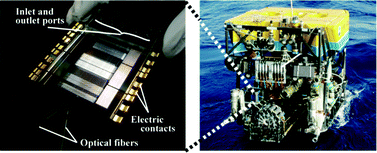Fujii and co-workers have fabricated a microfluidic device capable of analyzing microbial genes in deep sea environments. The genetic analyzer consists of a PDMS–glass microfluidic device that is capable of cell lysis, DNA purification, PCR, and optical detection. The Integrated In Situ Analyzer was named “IISA-Gene’’. It was developed and evaluated in Tokyo as a result of a fruitful collabotation between the University of Tokyo and the Tokyo Institute of Technology.
“We were able to use IISA-Gene to achieve spatiotemporally resolved profiling of microbial ecosystems in ocean environments”, claims Fujii. The technique which incorporates microfluidic technology minimises the risks of contamination through sample collections and manipulations.
By employing a simple flow-through PCR method, complicated genetic analyses can be automatically performed in extreme oceanic conditions. The performance of the system has been examined through at-sea experiments, taking it down to the deep sea using a remotely-operated vehicle. “Field evaluations at deep sea have shown that the amplification of the eubacterial universal 16S rRNA gene and the recovery of the PCR product to the surface”, says Fujii. The technology could provide a significant step to aid the discovery of further microbial life-forms in our oceans.
This is the 200th article published online by RSC Advances, a newly launched Journal by the Royal Society of Chemistry. You can download the full article for free by simply registering here.
Integrated in situ genetic analyzer for microbiology in extreme environments
Tatsuhiro Fukuba, Akimitsu Miyaji, Takuji Okamoto, Takatoki Yamamoto, Shohei Kaneda and Teruo Fujii
RSC Adv., 2011, 1, 1567-1573











